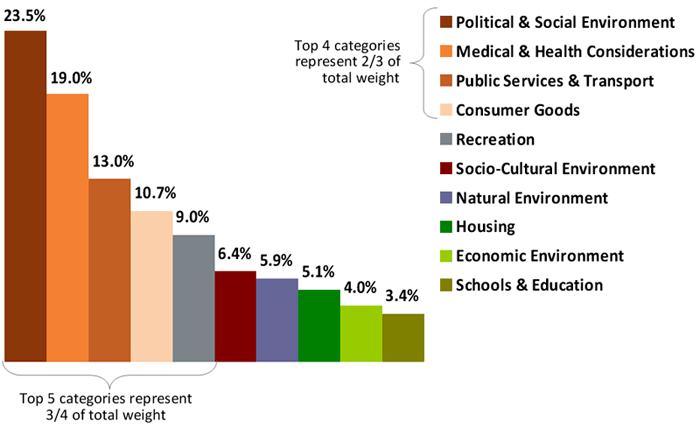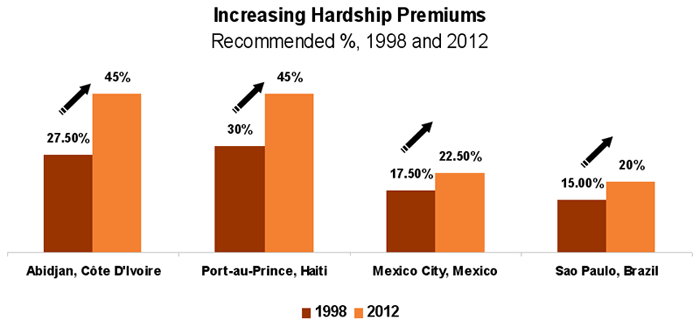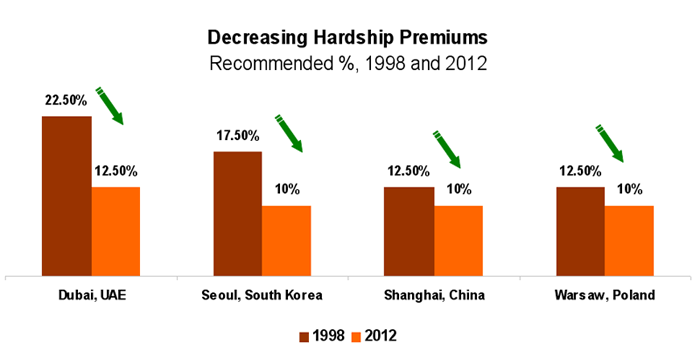
Vienna Tops the List Again – Vienna remained at the top of our Quality of Living Rankings in 2015, boasting the best quality of living for expatriates. Mercer’s Quality of Living Rankings cover 230 prevalent destinations for globally mobile talent and are based on our Quality of Living Survey.
The Quality of Living Survey assesses quality of living conditions to help multinational companies and other employers fairly compensate employees when placing them on international assignments. Employee incentives include a quality-of-living allowance and a mobility premium. Mercer’s Quality of Living Reports provide valuable information and hardship premium recommendations for over 440 cities throughout the world; the ranking covers 230 of these cities.
Vienna has the world’s best quality of living, according to the Mercer 2015 Quality of Living rankings. Overall, European cities dominate the top of the ranking along with major cities in Australia and New Zealand. Zurich, Auckland, and Munich are in second, third, and fourth place respectively. In fifth place, Vancouver is the highest-ranking city in North America and the region’s only city in the top 10. Singapore (26) is the highest-ranking Asian city, whereas Dubai (74) ranks first across the Middle East and Africa. Montevideo in Uruguay (78) takes the top spot for South America.
| Rank | City | Country |
| 1 | Vienna | Austria |
| 2 | Zurich | Switzerland |
| 3 | Auckland | New Zealand |
| 4 | Munich | Germany |
| 5 | Vancouver | Canada |
| 6 | Dusseldorf | Germany |
| 7 | Frankfurt | Germany |
| 8 | Geneva | Switzerland |
| 9 | Copenhagen | Denmark |
| 10 | Sydney | Australia |
(…)
| 221 | Nouakchott | Mauritania |
| 222 | Conakry | Guinea |
| 223 | Kinshasa | Congo, Democratic Republic of |
| 224 | Brazzaville | Congo, Republic of |
| 225 | Sana’a | Yemen |
| 226 | N’Djamena | Chad |
| 227 | Khartoum | Sudan |
| 228 | Port au Prince | Haiti |
| 229 | Bangui | Central African Republic |
| 230 | Baghdad | Iraq |
“Taking a short- or long-term work assignment in a new country is both an exciting and challenging experience for employees and their families,” said Slagin Parakatil, Principal at Mercer. “Cultures, societies, and comparatively different climates, as well as political instability, high crime rates, and poor infrastructure can be difficult to navigate and settle down in for employees and their families. Employers need to assess whether their staff and families will encounter any drop in quality of living when relocating and ensure they are fairly compensated for it.”
Europe
Despite concerns about economic growth, the cities of Western Europe continue to offer a stable environment for employees and employers. Vienna (1) is followed by Zurich (2), Munich (4), Düsseldorf (6), and Frankfurt (7). With Geneva and Copenhagen in 8th and 9th places, respectively, Western European cities take seven places in the top 10. The lowest-ranking cities in Western Europe are Belfast (63) and Athens (85). Cities in Central and Eastern Europe have a wider range of quality-of-living standards. The highest-ranking cities are Prague (68), Budapest, and Ljubljana (both ranked 75th). Emerging city Wroclaw (100), Poland, has a thriving cultural and social environment and good availability of consumer goods. The region’s lower-ranking cities are Kiev (176), Tirana (180), and Minsk (189), with Kiev experiencing a considerable drop in the rankings following political instability and violence in Ukraine overall.
In the UK, London (40) is the highest-ranking city, followed by Birmingham (52), Glasgow (55), Aberdeen (57), and Belfast (63). “UK cities overall enjoy high standards of quality of living and remain stable and attractive locations for businesses,” said Ellyn Karetnick, Principal at Mercer. “Security has been tightened in many major European cities following the attacks in Paris and Copenhagen, and Mercer is closely monitoring any potential impact on the living standard for expatriates and their families in these locations.”
Americas
In North America, Canada and the United States continue to offer a high standard of living. Vancouver (5) tops the list for this region, followed by fellow Canadian cities Toronto (15) and Ottawa (16), whereas San Francisco (27), Boston (34), and Honolulu (36) are the highest-ranking US cities. Mexico’s highest ranking city is Monterrey (109), while Mexico City is ranked 126th. The lowest-ranking cities in the North American region are Havana (193) and Port-au-Prince (228).
In South America, Montevideo (78), Buenos Aires (91), and Santiago (93) are the highest-ranked cities, whereas La Paz (156) and Caracas (179) rank lowest. In Brazil, Mercer has identified Manaus as an emerging city –it is ranked 127th. The city is already a thriving industrial centre and has a free economic zone – its good supply of consumer goods and relatively advanced infrastructure partially counteract the impact of Manaus’ lack of international schooling options for expatriates and remote location.
Asia-Pacific
Asia is the region with the largest range in quality-of-living standards, with the highest-ranking city, Singapore, in 25th place and the lowest-ranking, Dushanbe, Tajikistan, in 214th place. Topping the ranking across East Asian cities is Tokyo in 44th place; other key cities in this part of the region include Hong Kong (70), Seoul (72), Taipei (83), Shanghai (101), and Beijing (118). Notable emerging cities in this part of Asia include Cheonan (98), South Korea, and Taichung (99) in Taiwan. Chinese cities Xi’an and Chongqing (both ranked 142nd) are also emerging as business destinations. Their main challenges to improving quality-of-living standards are clean water provision and air pollution. However, advances in the telecommunications and consumer sectors have had some positive offsetting effects on their ranking.
Behind Singapore, the second highest-ranking city in Southeast Asia is Kuala Lumpur (84); other major cities here include Bangkok (117), Manila (136), and Jakarta (140). In South Asia, Colombo (132), ranks highest and is followed by emerging Indian cities Hyderabad (138) and Pune (145). Both cities rank higher for quality of living than the country’s more traditional business centres, Mumbai (152) and New Delhi (154). Considerable population increases in Mumbai and New Delhi in recent decades have increased existing problems, including access to clean water, air pollution, and traffic congestion.
In the Pacific, New Zealand and Australian cities are some of the highest-ranked cities globally, with Auckland in 3rd, Sydney in 10th, Wellington in 12th, and Melbourne in 16th.
Middle East and Africa
In 74th place, Dubai ranks highest for quality of living across the Middle East and Africa region. It is followed by Abu Dhabi (77), also in the UAE, and Port Louis (82), Mauritius. In South Africa, Durban (85) is an emerging city and ranks higher than the country’s traditional business centres, Cape Town (91) and Johannesburg (94). Durban’s higher ranking is mainly due to its high-quality housing, plentiful recreational offerings and good consumer goods availability. However, the city’s crime problems keep it from reaching the top 50.
Ranking 230th, Baghdad is the lowest-ranking city in the region and on the overall list.
Emerging Cities
Mr. Parakatil added: “As with last year’s survey, we continue to recognise emerging cities that are increasingly becoming competitors to traditional business and finance centres. These so called ‘second-tier emerging cites’ are investing, particularly in infrastructure to improve their quality-of-living standards and ultimately attract more foreign companies.”
As part of the rankings, Mercer highlights select cities that are evolving as business centers around the world.
- Durban, South Africa (85) – Growing manufacturing and shipping center
- Cheonan, South Korea (98) – A tech and university center
- Taichung, Taiwan (99) – Rich cultural traditions have helped bring in key local and international industries
- Wroclaw, Poland (100) – Strong talent pool and good infrastructure
- Manaus, Brazil (127) – Manaus attracts businesses as a Free Economic Zone
- Hyderabad, India (138) – Home to many in the service industry (IT, insurance, and financial companies)
- Chongqing, China (142) – Major manufacturing (esp. automotive industry) center and transportation hub
- Xi’an, China (142) – An economic and technology development zone
- Pune, India (145) – Hosts IT and automotive companies
Methodology
Mercer evaluates local living conditions in more than 440 cities it surveys worldwide. Living conditions are analysed according to 39 factors, grouped in 10 categories:
- Political and social environment (political stability, crime, law enforcement, etc.)
- Economic environment (currency exchange regulations, banking services)
- Socio-cultural environment (media availability and censorship, limitations on personal freedom)
- Medical and health considerations (medical supplies and services, infectious diseases, sewage, waste disposal, air pollution, etc)
- Schools and education (standards and availability of international schools)
- Public services and transportation (electricity, water, public transportation, traffic congestion, etc)
- Recreation (restaurants, theatres, cinemas, sports and leisure, etc)
- Consumer goods (availability of food/daily consumption items, cars, etc)
- Housing (rental housing, household appliances, furniture, maintenance services)
- Natural environment (climate, record of natural disasters)
The scores attributed to each factor, which are weighted to reflect their importance to expatriates, allow for objective city-to-city comparisons. The result is a quality-of-living index that compares relative differences between any two locations evaluated. For the indices to be used effectively, Mercer has created a grid that allows users to link the resulting index to a quality of living allowance amount by recommending a percentage value in relation to the index.
These rankings indicate differences in quality of living factors affecting expatriates in popular assignment destinations. They are not used for setting hardship allowances. Mercer’s Quality of Living Reports and Local Evaluation Reports offer comprehensive location-specific analyses and hardship premium recommendations.

Shifts in QOL Score
Obviously, a city’s quality of living can change over time – sometimes significantly. Here are eight cities and Mercer’s recommended hardship premiums for 1998 and 2012. Remember, the higher the recommended hardship premium, the lower a city’s quality-of-living score:


Some cities’ quality of living was dramatically worse in 2012 than in 1998 – due to many reasons, including political turmoil (Abidjan) or a combination of factors including natural disasters (Port-au-Prince). In others, as in Dubai and Seoul, the changes are significantly for the better. Usually big improvements are due to major investments in infrastructure such as schools, public transport, electricity, and telephones services, as well as improvements to political stability, and increased measures to curb pollution.
In each case, employers should check on relative changes in quality of living for all their major host cities to ensure that they are compensating their expatriates fully – based, of course, on employers’ own philosophies toward hardship premiums.
“Quality of Life” vs. “Quality of Living”
At first, “quality of life” may sound like a synonym of “quality of living,” but it is not.
“Quality of life” is a highly personalized term, often used in a medical or psychological context. It is an appraisal of an individual’s subjective emotional state and personal life. You can live in a city that ranks high in terms of quality of living and still suffer from a low quality of life because of unfortunate personal circumstances (illness, unemployment or loneliness, etc).
By contrast, “quality of living” embodies objective aspects of daily living that most people agree on as being important for having good living standards, such as personal safety and security, health, transport infrastructure, availability of consumer goods, and adequate housing, schooling, and recreation opportunities.

 Seite drucken
Seite drucken